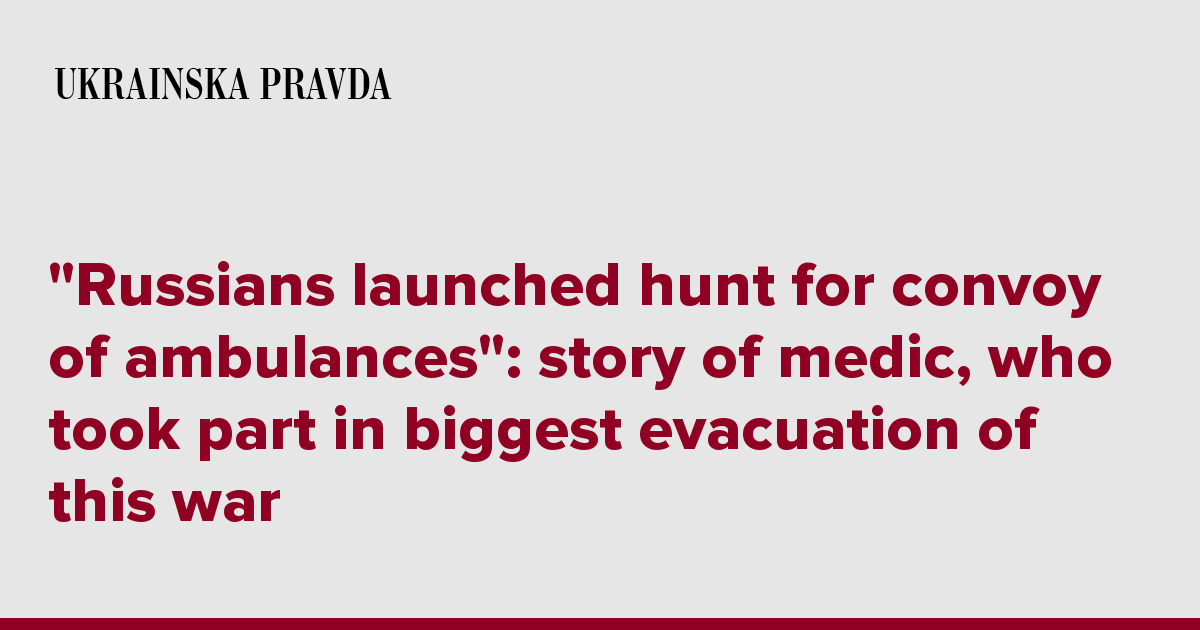“Russians launched hunt for convoy of ambulances”: story of medic, who took part in biggest evacuation of this war

Before the full-scale war, now National Guardsman Dmytro Drozd was a civilian medic. After 24 February, he became a volunteer at the Red Cross and participated in the evacuation operations of civilians from Berdiansk, Melitopol and Mariupol. The National Guard of Ukraine, where Dmytro currently serves, shared what made the man become a military medic.
While still a volunteer, Dmytro took part in the largest evacuation since the beginning of the full-scale war of the Russian Federation against Ukraine. Approximately 4,500 civilians were evacuated from the now temporarily occupied Berdiansk. There were 40 small children in the bus driven by Dmytro, 3 of whom had pneumonia.
"The Russian occupiers didn't care - children/not children, sick/not sick. Three of them had a temperature of 40 [Celsius - ed.]. The children were sick.
An ambulance was driving in front of us. There was a wounded 12-year-old girl with a punctured lung. [Her - ed.] father was sitting with her, and the ambulance driver came out. The child was getting paler, so it was necessary to get to the city as soon as possible.
This is what makes you keep going...
They didn't even want to let us out. They said that we will go on to Melitopol. It was very scary, because we knew that there was only one way out of Melitopol.
They simply wanted to take us into captivity," the medic recalls. Despite the obstacles and checks that the occupiers arranged "every kilometre", the evacuation was still carried out. Then civilians were brought to Zaporizhzhia.
We have launched English Twitter!
Follow us!
Dmytro told how the Russians arranged inspections at their posts: "People were stripped, their shoes taken off, their phones and money taken away. It was not very pleasant, but I had to sit and hold on to the steering wheel very tightly so as not to cause a commotion, because I was thinking of the children who were travelling with me."
The medic also took part in the evacuation of people from Azovstal, the Mariupol metallurgical plant. For the first time, a convoy of 150 buses and 50 ambulances went there on 8 March, but the occupiers did not allow anyone to take the civilians back then. "They didn't let us pass neither from the Tokmak side nor from the side of Huliai-Pole.
Then they launched a hunt for our convoy. They tried to shoot at us. The occupiers didn't let us take a single person out of Azovstal.
When we returned, they stood near Vasylivka with machine guns and checked every bus, so that no one else was in the transport except the driver. "I didn't see a single positive emotion [on the occupiers' faces - ed.] towards children and the civilian population - from one person to another," says Dmytro. According to him, it was this evacuation, which did not happen, that made him go to serve in the National Guard of Ukraine "After I returned from Mariupol on 4 May, I could no longer look calmly at what was happening around," the man emphasised.
Dmytro gained his first combat experience in Velyki Novosilky at the end of June. As a combat medic, the soldier "saw everything there": "One woman had to be resuscitated back to life."
Dmytro saved the wounded woman during a mortar shelling. When he reached the woman, she was sitting in a pool of blood, and then fell on her back. "I searched for a pulse.
It was very weak. The woman had broken bones in both of her legs. The driver, the paramedic and I quickly put her in the car.
I saved her on the way," says the doctor. The oldest grandmother, whose life Dmytro saved, was 89 years old. During a mortar shelling, debris tore off a calf on her leg.
Dmitry, as a military medic, has to not only save lives, but also see death. He told about a case when a person died in his arms. "As a medic, I felt the last heartbeat in my hands.
I went to a civilian woman - she was crushed by a slab. Before my arrival, she was taken out. When I touched her, I felt her heart beating for the last time.
I understood that nothing was going to happen, I couldn't do anything because her skull was completely crushed. She was a teacher. She was 58 years old.
All I had to do was take her [to the morgue - ed.]." Dmytro admits that during all this time he provided help to people without fear or hesitation. He says he understood that it was his job.
"I have to save people's lives," the soldier concluded.
Journalists fight on their own frontline. Support Ukrainska Pravda or become our patron!